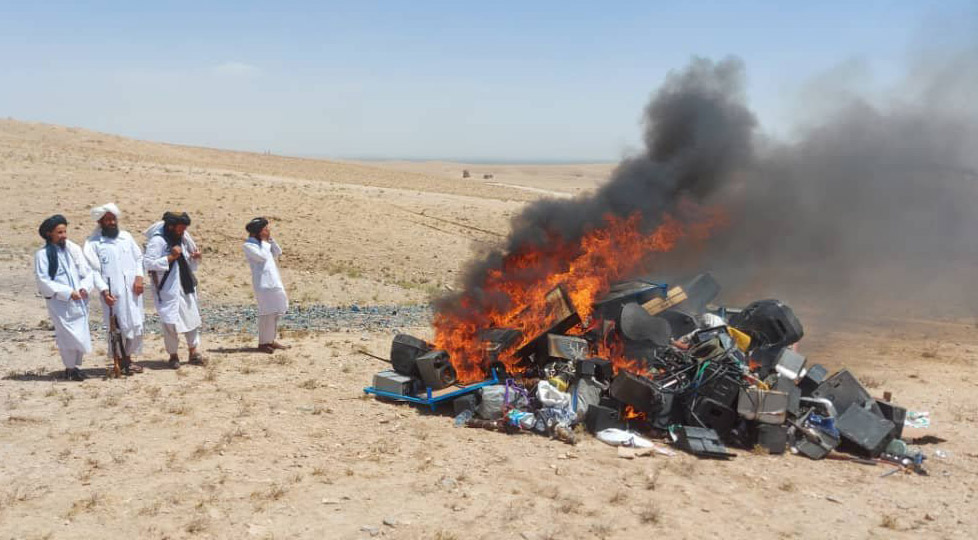Ayaz Gul

Taliban burn musical instruments in Parwan province.
Taliban morality police in Afghanistan said Tuesday that they had "seized and destroyed" more than 21,000 musical instruments over the past year as part of a crackdown on what they called anti-Islam practices.
Officials of the so-called Ministry for the Propagation of Virtue and the Prevention of Vice discussed their “annual performance” at a news conference in Kabul a day after Taliban authorities publicly staged a mass burning of hundreds of musical instruments in the nearby northern Parwan province.
The provincial moral police department also urged residents not to use musical instruments at weddings and other celebrations.
Speaking in the Afghan capital Tuesday, ministry officials claimed to have destroyed thousands of “immoral films” and blocked many more “from use on personal computers” nationwide “as part of societal reforms” being undertaken by the Taliban administration. They did not elaborate on the nature of the films.

Aug.19,2024: Taliban musical instruments burning ceremony in Parwan province.
The ministry said without discussing specifics that it had “successfully implemented 90% of reforms across audio, visual, and print media” in Afghanistan.
Free media advocacy groups and local journalists say that Taliban leaders have significantly curtailed press freedom and access to information in the country.
The Islamist Taliban revived the Ministry of Vice and Virtue to police public morality after retaking control of the war-shattered, impoverished South Asian nation three years ago when all U.S.-led Western troops withdrew from Afghanistan after their involvement in the war for almost two decades.
The Taliban ministry has introduced strict guidelines for local media professionals, binding female presenters and guests to comply with an “Islamic” dress code on air requiring that only their eyes be visible.
Women are prohibited from working on national radio and television stations, and dramas featuring female performers are banned. De facto Afghan authorities have also enforced strict “gender-based segregation” in workplaces at large.
Meanwhile, Hibatullah Akundzada, the reclusive Taliban supreme leader, convened a meeting Tuesday of governors of all 34 Afghan provinces in the southern city of Kandahar and asked them to “uphold sound Islamic governance,” his spokesman said in a post-meeting briefing.
Strengthen the Islamic framework, enforce Sharia law, and reinvigorate divine ordinances,” Zabihullah Mujahid quoted Akhundzada as telling the meeting
Mohammad Khalid Hanafi, the minister of vice and virtue, was quoted by state media as saying on Monday that the Taliban “are determined to implement Islamic Sharia and no one’s pressure is acceptable in this regard.”
The morality ministry reported Tuesday that it also had dismissed more than 280 security force members for failing to grow a beard in line with the Taliban’s strict interpretation of Islamic law.
The United Nations Assistance Mission in Afghanistan (UNAMA) said last month that the Taliban’s morality police were contributing to “a climate of fear and intimidation” among the people and identified the ministry as the leading violator of human rights in the Taliban government, which is not recognized by any country.
The U.N. report noted that the activities of the de facto ministry have had “negative impacts on the enjoyment of human rights and fundamental freedoms”… in Afghanistan, with a discriminatory and disproportionate impact on women.”
The morality police department has banned women’s beauty salons, prohibited females from traveling without a male guardian beyond 78 kilometers from their home limits, and banned them from visiting parks, gyms, and public baths.
The Taliban have also banned school education for girls beyond the sixth grade, and many women are not allowed to work in public as well as private organizations, including U.N agencies.
The U.N. Education, Scientific, and Cultural Organization said in its new report last week that Taliban authorities had “deliberately deprived” 1.4 million girls of schooling since returning to power, putting at risk the future of an entire generation and making Afghanistan the only country in the world to deny girls ages 12 and older access to education.
Taliban officials dismiss criticism of their governance as interference in the country’s internal matters and defend their policies, saying they are aligned with Afghan culture and Islamic law.
During the previous Taliban rule in Kabul from 1996 to 2001, the Ministry of Vice and Virtue garnered notoriety for its arbitrary abuses. Particularly, women and girls were banned entirely from education and employment at that time.

The Taliban burning musical instruments in Herat province.



